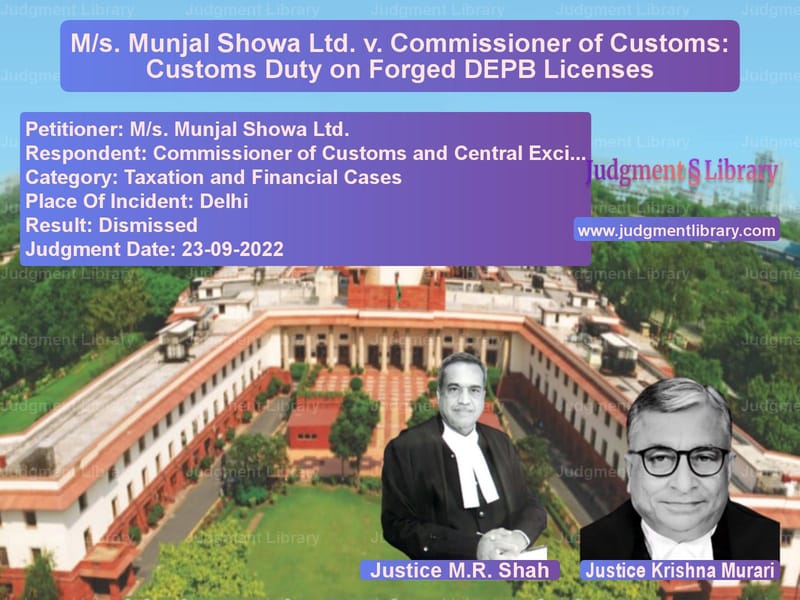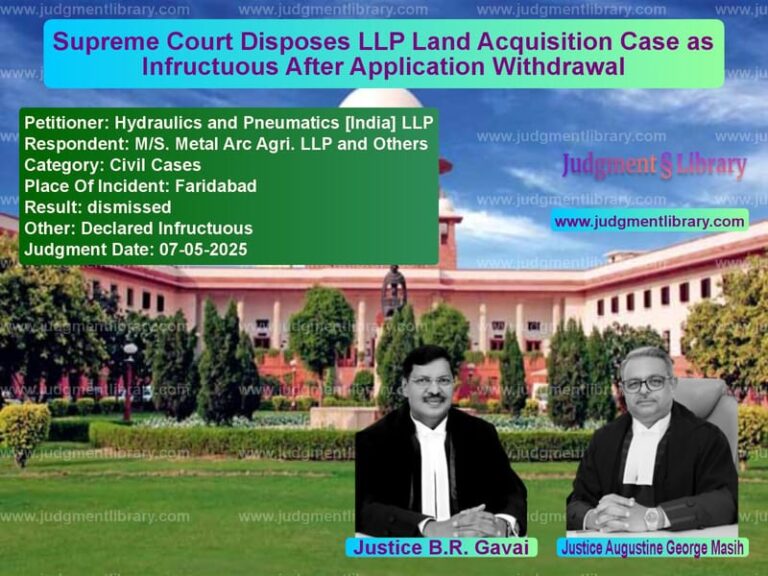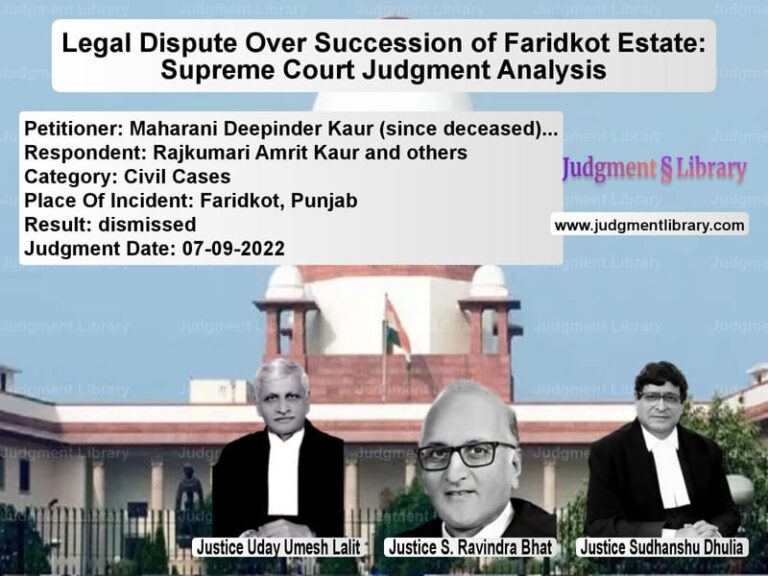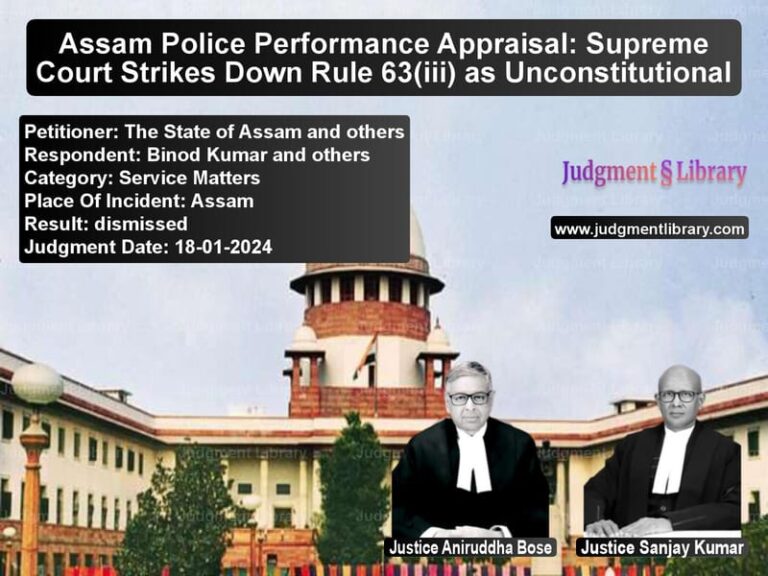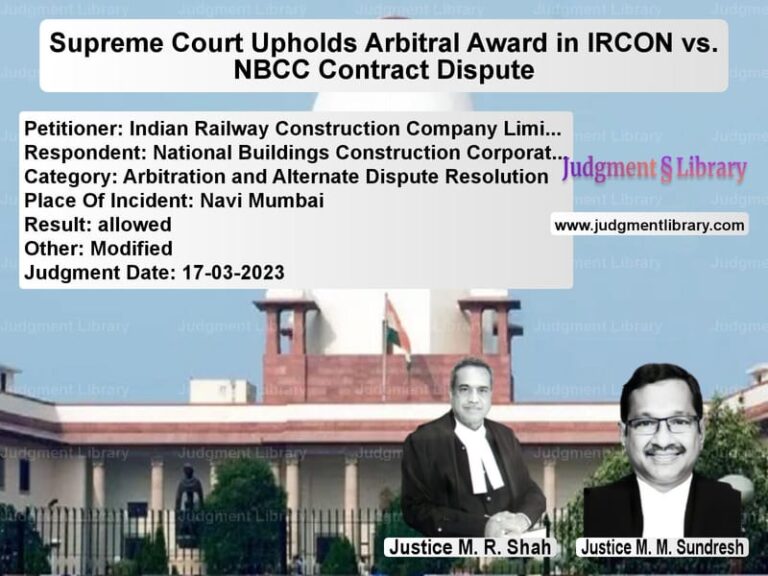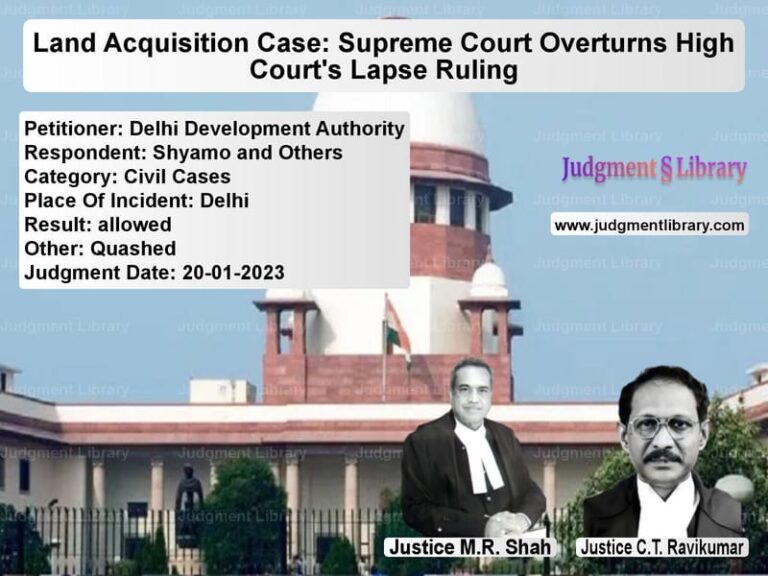M/s. Munjal Showa Ltd. v. Commissioner of Customs: Customs Duty on Forged DEPB Licenses
The case of M/s. Munjal Showa Ltd. versus the Commissioner of Customs (Delhi – IV) involves an appeal concerning the liability for customs duty following the use of forged DEPB (Duty Entitlement Passbook) licenses for the import of goods. The appellant, M/s. Munjal Showa Ltd., had imported consignments using Transfer Release Advices (TRAs) issued against these forged DEPB licenses, and upon verification, it was found that the licenses were fraudulent. The issue revolves around whether the customs duty exemption, which had been availed through these fraudulent documents, was valid, and whether the appellant should be held liable for the payment of customs duty along with interest and penalty.
According to the facts of the case, the appellant imported goods through the Inland Container Depot (ICD) at Ballabgarh using TRAs issued by the Bombay Customs House. However, the Customs Department discovered that the DEPB licenses on which these TRAs were based were forged. The goods had been cleared in May/June 2003, and in a letter dated August 5, 2003, the Assistant Commissioner at ICD Faridabad informed the appellant that the DEPB licenses used for the transaction were forged. The appellant was instructed to pay the duty along with interest as the benefit of the DEPB scheme had been availed fraudulently.
The appellant, upon receiving the letter, expressed surprise at the allegations and stated that they would take steps to lodge an FIR against the transferor of the forged licenses. The appellant also sought time to make payment. On August 12, 2003, the appellant deposited the duty under protest. Subsequently, the Customs Department issued a show-cause notice on October 3, 2006, alleging that the appellant had evaded duty by using forged documents, specifically the forged DEPB licenses, which had been used to obtain duty exemptions. The appellant contested the show-cause notice, arguing that it was issued beyond the period of limitation and that there was no intention to evade customs duty, despite the DEPB licenses being forged.
The Commissioner of Customs, in an order passed on October 17, 2007, concluded that the DEPB licenses were forged and void from the outset. He further stated that the exemption claimed by the appellant on the basis of these licenses was inadmissible, and consequently, the goods were liable for confiscation. The appellant was also directed to pay interest and penalty for the fraudulent claim. The appellant challenged this order before the Customs, Excise and Service Tax Appellate Tribunal (CESTAT), which upheld the duty liability but remanded the matter to the original authority regarding the penalty. However, the issue regarding duty liability was confirmed by the Tribunal.
The appellant then appealed to the High Court under Section 130 of the Customs Act, contesting the extended period of limitation invoked by the Department. The appellant argued that the show-cause notice issued was beyond the prescribed limitation period and that the Department had not demonstrated any fraudulent intent on the part of the appellant. The High Court, however, dismissed the appeal and upheld the Tribunal’s decision, confirming the customs duty demand on the grounds that fraud vitiates everything, and therefore, the extended period of limitation could be invoked by the Department.
In response to the High Court’s judgment, the appellant filed an appeal in the Supreme Court, challenging the decision, particularly the issue of invoking the extended period of limitation. The appellant’s counsel argued that the Department failed to demonstrate that the appellant had knowledge of the fraudulent nature of the DEPB licenses and, therefore, should not be liable for the extended period of limitation. The appellant further contended that the delay in the issuance of the show-cause notice should bar the Department from levying the duty and interest retroactively.
The respondent, represented by the Commissioner of Customs, argued that the DEPB licenses used by the appellant were forged and fraudulent, and as such, the exemption claimed was invalid. The respondent’s counsel emphasized the principle that fraud vitiates all and that fraudulent documents cannot form the basis of customs exemptions. The respondent also argued that the extended period of limitation was rightly invoked since fraud was involved, and the appellant should be held liable for the customs duty and interest.
The Supreme Court, after hearing the arguments, ruled in favor of the respondent, confirming the duty liability of the appellant. The Court emphasized the principle that fraud vitiates everything and that the use of forged documents to claim customs exemptions was an act of fraud. The Court found that the Department was justified in invoking the extended period of limitation, given the fraudulent nature of the DEPB licenses. The Court also noted that the appellant had deposited the duty under protest but had not provided sufficient evidence to counter the allegations of fraud.
The Court further clarified that the appellant’s knowledge of the fraudulent nature of the documents was irrelevant in determining duty liability, as the issue was about the validity of the DEPB licenses, not the appellant’s intent. The Court upheld the Tribunal’s order regarding the duty liability and dismissed the appellant’s appeal. However, the penalty proceedings were remanded to the adjudicating authority for further consideration.
This case serves as an important reminder of the consequences of engaging in fraudulent activities in customs matters. It underscores the legal principle that fraudulent documents cannot be used to claim exemptions or benefits and that the Department is entitled to levy duty and interest when such documents are discovered. It also reinforces the application of the extended period of limitation in cases involving fraud and the importance of verifying the genuineness of documents in transactions involving customs duties.
Petitioner Name: M/s. Munjal Showa Ltd..Respondent Name: Commissioner of Customs and Central Excise.Judgment By: Justice M.R. Shah, Justice Krishna Murari.Place Of Incident: Delhi.Judgment Date: 23-09-2022.
Don’t miss out on the full details! Download the complete judgment in PDF format below and gain valuable insights instantly!
Download Judgment: ms.-munjal-showa-lt-vs-commissioner-of-cust-supreme-court-of-india-judgment-dated-23-09-2022.pdf
Directly Download Judgment: Directly download this Judgment
See all petitions in Income Tax Disputes
See all petitions in Banking Regulations
See all petitions in Tax Refund Disputes
See all petitions in Customs and Excise
See all petitions in Commercial Insurance Disputes
See all petitions in Judgment by Mukeshkumar Rasikbhai Shah
See all petitions in Judgment by Krishna Murari
See all petitions in dismissed
See all petitions in supreme court of India judgments September 2022
See all petitions in 2022 judgments
See all posts in Taxation and Financial Cases Category
See all allowed petitions in Taxation and Financial Cases Category
See all Dismissed petitions in Taxation and Financial Cases Category
See all partially allowed petitions in Taxation and Financial Cases Category

